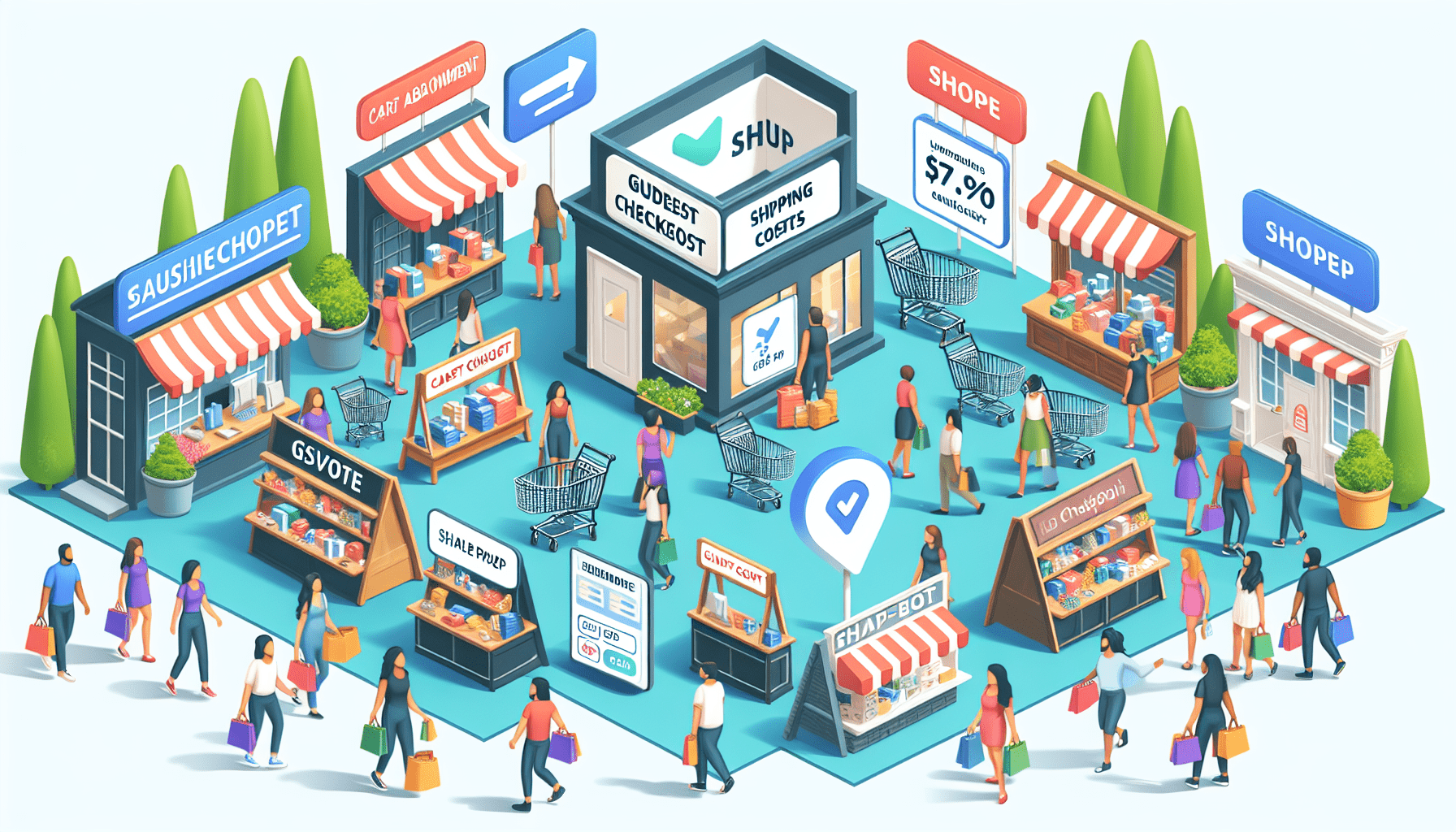BLOGS
Top Shopping Cart Solutions: Find the Perfect Fit for Your Online Store

Looking for shopping cart solutions? It’s a make-or-break decision for your online store. This guide cuts through the noise to give you straightforward comparisons, laying out costs, features, and user experiences for top choices in 2024. Find your store’s perfect match without the hassle and get ready to enhance your ecommerce venture.
Key Takeaways
- Shopping cart software is essential for online transactions, offering features like product selection, total cost calculation, adjustable quantities, and streamlined checkout processes.
- Top shopping cart solutions in 2024 include Shopify, WooCommerce, BigCommerce, Magento, and 3DCart, each with unique attributes like extensive customization, ease of use, community support, and seamless payment processing integration.
- Choosing the right shopping cart solution for one’s online store depends on factors such as business size and objectives, desired features and functionality, budget, and compatibility with existing systems.
Understanding Shopping Cart Solutions
As e-commerce continues its rapid growth, ecommerce shopping cart software has become indispensable for online businesses. They serve as invaluable tools, connecting customers and sellers for seamless transactions. These platforms handle essential aspects of online shopping, including:
- Calculation of purchase totals
- Taxes
- Discounts
- Shipping costs
Thereby providing a smooth purchasing experience for customers and efficient order management for merchants.
What is a Shopping Cart Solution?
A shopping cart solution is akin to an online shopping cart, a tool that facilitates shopping online. Think of it as the online equivalent of the physical shopping carts you push through the aisles of your favorite supermarket. Online shopping carts allow customers to:
- Select and store products
- View their selected items
- Adjust quantities or remove items
- Proceed to checkout and complete the purchase.
The software calculates the total cost, including taxes and shipping charges, presenting customers with the total amount due before they finalize their purchase. The range of shopping cart solutions is vast, from hosted solutions maintained by third-party providers to self-hosted solutions installed on your own server.
Why Use a Shopping Cart Solution?
A shopping cart solution doesn’t merely facilitate transactions; its effective implementation can boost sales conversions, enrich the customer experience, and make order management more efficient. With automated processes, such as inventory tracking and tax calculations, merchants can save time and reduce the potential for errors.
For shoppers, an uninterrupted checkout process can greatly improve their shopping experience, encouraging repeat purchases and fostering customer loyalty.
Top Shopping Cart Solutions in 2024
As we journey through 2024, several shopping cart solutions have risen to the top, each offering unique features that cater to the diverse needs of online businesses. Let’s explore some of the market leaders:
- Shopify
- WooCommerce
- BigCommerce
- Magento
Each of these platforms offers unique features and benefits, from advanced customization options to user-friendly interfaces and robust integrations, making them some of the best shopping cart software in 2024.
Shopify
Shopify is a comprehensive e-commerce platform that caters to businesses of all sizes. With a user-friendly interface, customizable templates, and a robust set of features, it’s no wonder that Shopify is a top choice for online businesses. With unique features such as Tap to Pay on iPhone and Shopify Functions, it offers a plethora of possibilities to both businesses and developers.
WooCommerce
Offering extensive customization options and a large community of users and developers, WooCommerce is an open-source shopping cart plugin for WordPress. It’s particularly suitable for small businesses that already have a WordPress website and want to start selling without overhauling their entire site.
WooCommerce offers a range of plugins that enhance functionality and integration with a wide range of external services, such as payment processors and shipping providers, making it a flexible and payments agnostic option for many businesses.
BigCommerce
BigCommerce is an all-in-one e-commerce platform that provides a robust set of features designed to give you all the tools you need to run a successful store. Some key features of BigCommerce include:
- Support for multiple currencies
- Generation of essential business reports
- Advanced SEO tools
- Customization capabilities
- Scalability
- Security
- Mobile optimization
With these features, BigCommerce offers a comprehensive ecommerce solution for your ecommerce website needs.
With additional features like cart abandonment recovery and variable discounts, BigCommerce is a versatile payments agnostic solution for businesses of all sizes.
Magento
Ideal for large businesses seeking a highly customizable solution, Magento is a powerful open-source e-commerce platform with a wide range of features. It offers extensive customization options, advanced features such as multi-store management, and a mobile-friendly configuration.
The platform is designed to handle high traffic volumes and provides performance and scalability for expanding businesses, thanks to its large and engaged community of developers and users.
How Much Does Shopping Cart Software Cost?

The cost, which can vary significantly, is a crucial factor when contemplating a shopping cart solution. While the usual cost for shopping cart software is approximately $25 per month, the price can substantially increase depending on the specific solution and the features needed. While there are free open-source solutions, they may require more setup and maintenance on your part.
Consider not just the upfront cost, but also the long-term value of the solution, keeping in mind its features and the adaptability necessary for your business’s growth.
Shopping Cart vs eCommerce Platform
When exploring online selling solutions, you’ll often come across two terms: shopping cart software and e-commerce platforms. While they both serve a similar purpose, there are key differences.
A shopping cart essentially lets your customers add products to their ‘cart’, calculates the total cost, and facilitates the checkout process. Conversely, a shopping cart platform is a multifaceted software tool that not only eases online sales but also offers other crucial tools like inventory management, payment gateway integration, and marketing aids.
Factors to Consider When Choosing a Shopping Cart Solution
Choosing the right shopping cart solution is critical to the success of your online store. Several aspects to consider include:
- Your business’s size and objectives
- The features your store needs
- Your budget
- The solution’s compatibility with your current systems
Each of these factors significantly impacts your online store’s performance and usability, so careful assessment and prioritization are crucial.
Business Size and Goals
Understanding your business size and goals is the first step in selecting the right shopping cart solution. Here are some factors to consider:
- Small business: A basic cart may be sufficient for a small business.
- Large enterprise: A robust software suite that integrates inventory management, analytics, and multi-channel selling may be necessary.
- Business goals: Consider your specific goals and requirements when choosing a shopping cart solution.
If you’re planning to scale your business, you’ll want a solution that can scale with you.
Features and Functionality
The features and functionality of your shopping cart software greatly influence the user experience. Choosing a solution that provides:
- an intuitive interface
- seamless navigation
- an uncomplicated checkout process is crucial. Look for features like:
- multiple payment gateway support
- SEO tools
- marketing integrations.
Your shopping cart software should also be scalable to handle an expanding product range as your business grows.
Pricing and Budget
It’s crucial to consider your budget when selecting a shopping cart solution. Shopping cart software can range from free to hundreds of dollars per month. Consider not only the initial cost but also the long-term cost. For instance, some solutions offer lower monthly fees if you pay annually.
Also, take into account any additional costs for integrations and features, as well as the expense of hiring professional developers for customization if the software is complex.
Compatibility and Integration
Ensuring that your chosen shopping cart solution is compatible with your existing systems is key to smooth operation. Make sure the shopping cart software you choose can work with your payment gateway, your website platform, and other tools you rely on.
Moreover, it should enable integration with other systems like CRM, accounting, and email marketing tools for efficient business processes.
Tips for Optimizing Your Online Store with Shopping Cart Solutions

Implementing a shopping cart solution is just the beginning. To truly reap the benefits, you need to optimize your online store for a smooth and seamless user experience. Here are some strategies to help you effectively optimize your online store for better performance and increased sales:
- Enhance the overall shopping experience
- Reduce cart abandonment rates
- Streamline order management
- Leverage marketing tools
By implementing these strategies, you can ensure that your online store is optimized for success.
Enhancing the User Experience
In e-commerce, user experience is of utmost importance. Here are some tips to ensure a superior user experience:
- Ensure that your products are easily discoverable and viewable
- Provide clear product descriptions
- Optimize your site for fast loading
- Use an intuitive layout
- Offer a seamless checkout process
By following these tips, you can enhance the user experience on your e-commerce site.
Enhance user satisfaction significantly by offering numerous payment options and confirming that your site is mobile-friendly.
Reducing Cart Abandonment Rates

Lowering cart abandonment rates is essential for boosting sales. Here are some strategies to consider:
- Offer a guest checkout option to streamline the checkout process and reduce friction for customers.
- Ensure a smooth checkout process with minimal steps and easy navigation.
- Clearly communicate shipping costs and delivery times upfront to avoid any surprises.
- Include a clear call to action on the checkout page, such as “Complete Your Purchase” or “Place Order”, to encourage customers to proceed with their purchase.
Implementing these strategies can help improve user experience and reduce the likelihood of cart abandonment.
Streamlining Order Management
An efficient order management process simplifies operations for both the business owner and the customer. Automated inventory tracking and shipping calculations remove the guesswork from the process, reducing errors and saving time. Additionally, a tax management tool can be invaluable in keeping up with the complex world of sales tax.
Leveraging Marketing Tools
Marketing tools are indispensable for advertising your online store and attracting traffic. Some essential marketing tools include:
- Email marketing tools
- SEO tools
- Social media integration
- Abandoned cart reminders
These features help you effectively engage with your customers, promote your products, and boost sales.
Frequently Asked Questions
What is the best shopping cart software?
The best shopping cart software options include Shopify, WooCommerce, Magento, BigCommerce, Wix, 3dcart, and PrestaShop. Each has its own strengths and can cater to different business needs.
How do I optimize my shopping cart?
To optimize your shopping cart, consider including an exhaustive product summary, ensuring a mobile-friendly UX, keeping the design clean and intuitive, and making it easy to edit the cart. Additionally, reveal shipping costs early on and employ order summary, live chat, mobile-friendly checkout, and trust-building tactics.
How much does shopping cart software cost?
Shopping cart software costs around $25 per month on average, but the price can vary significantly based on features and specific solutions.
How can I reduce the cart abandonment rate in my online store?
To reduce cart abandonment, consider offering a guest checkout option, being transparent with pricing information, and streamlining the checkout process. These steps can help improve your online store’s conversion rate significantly.















